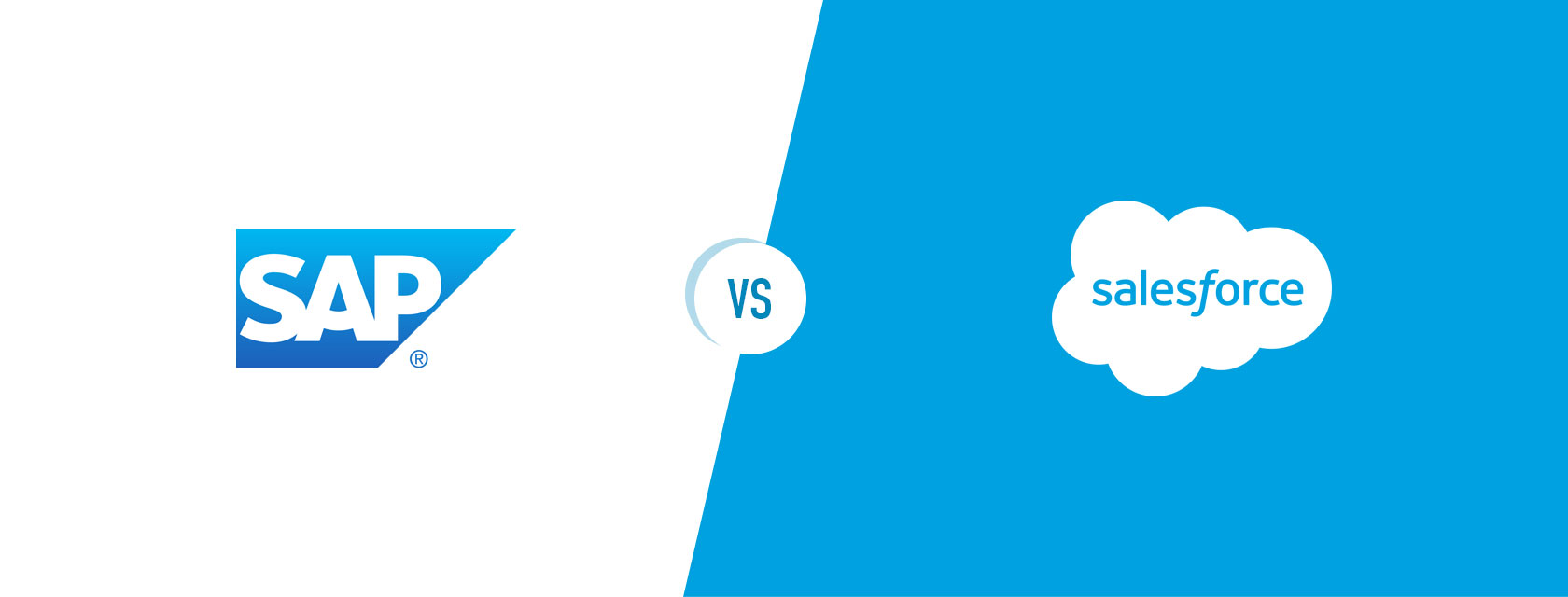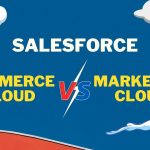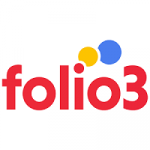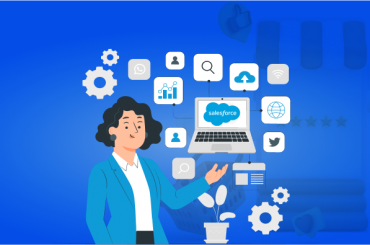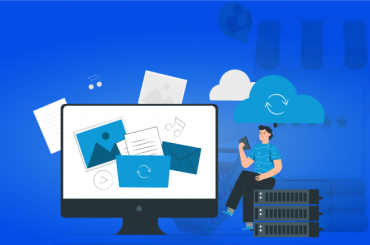SAP Commerce Cloud vs Salesforce Commerce Cloud: Which One Is The Best
Last Updated | April 22, 2023
Table of Contents
SAP Commerce Cloud and Salesforce Commerce Cloud are two of the leading ecommerce platforms, specifically developed to support the needs of enterprise-level users.
Read on to know what each platform brings to the table and how you can choose the best platform for your business.
Introduction
Read this article to know which one is superior: Salesforce Commerce Cloud Vs Salesforce Marketing Cloud
The global eCommerce industry has spiked up to 22% in annual growth and is considered to be the fastest-growing retail area.
For this reason, it’s become crucial for businesses to invest in a reliable eCommerce platform, which brings us to Salesforce Commerce Cloud and SAP Cloud (yes, it was previously called SAP Hybris).
Salesforce Commerce Cloud development is quite convenient but SAP has advanced features, which may be little too complex for untrained persons.
So, to help you make the right choice, we have SAP Commerce Cloud vs Salesforce Commerce Cloud comparison in this article!
Compare the similarities and differences between Salesforce Commerce Cloud vs Demandware
SAP Commerce Cloud vs Salesforce Commerce Cloud: Which One Is the Best?
With constantly-changing consumer expectations in the tech-savvy marketplace, it has become challenging for businesses to deliver enhanced and personalized shopping experiences to gain a competitive edge in the eCommerce industry.
For this reason, SAP Commerce Cloud vs Salesforce Commerce Cloud is often debated, as these platforms enable businesses to offer enhanced consumer experience.
Both these platforms are designed with top-notch features and present exceptional business cases to the stakeholders who are involved in the deployment process.
So, to help you choose between SAP Commerce Cloud and Salesforce B2B Commerce integration, we are comparing these platform’s functionality, pricing, B2C and B2B feature, security protocols, AI features, and Omnichannel function.
You might also want to read: Salesforce Merchandising
An In-Depth Overview: SAP Commerce Cloud vs Salesforce Commerce Cloud
Key Comparison 1: Platform Functionality
SAP’s cloud platform has been designed with a unified system to manage the products, orders, content, as well as customer experience, which makes it suitable for larger enterprises.
In addition, it has the primary eCommerce features, including checkout, promotions, order management, and cart, promising better business growth.
On the contrary, the Salesforce Commerce Cloud consultant has more advanced eCommerce features, such as multi-site management, localization, and one-touch feature for mobile payments, and you get access to other Salesforce tools as well.
It wouldn’t be wrong to say that both of them provide a consistent and enhanced brand experience.
However, Salesforce Commerce Cloud wins this one as it supports the customers without compromising on their convenience.
It has the capacity to support the full sales cycle, including brand involvement, completing the orders, and managing the purchase transactions.
However, you may also check out the offerings of WooCommerce integration with SAP to extend the base features.
Read about top Salesforce trends that will help businesses keep up with all the latest Salesforce future developments
Key Comparison 2: Business Model Flexibility
The second point of SAP Commerce Cloud vs Salesforce Commerce Cloud is the flexibility of these platforms’ business models.
With SAP, the model is designed with customization and scalability in mind.
The current features are easy to replace and adapt. In addition, there are accelerators available that allow the users to reduce the cost and time spent on eCommerce projects.
On the other hand, Salesforce Commerce Cloud offers a full-range digital eCommerce experience to the customers with the help of websites – it creates a unified and automated experience.
For instance, there is a business manager tool that allows businesses to manage promotions, products, inventory, and prices, promising higher productivity. In addition, there is an Apply Pay integration for quick and secure payments.
Questions? Ask about Salesforce Commerce Cloud implementation, or anything else. Also, Read this Guide What Is Salesforce Commerce Cloud
Key Comparison 3: Pricing Models
The third point of SAP Commerce Cloud vs Salesforce Commerce Cloud is the difference in pricing models. To begin with, Salesforce has a revenue-based model.
Which means there is a primary rate that applies to every client while the license charged are calculated according to the business’s size and revenue.
There are three plans available at Salesforce, including;
- Starter – for the B2B segment, it costs $4 an order and 1% gross merchandise value for B2C
- Growth – for the B2B segment, it costs $6 an order and 2% gross merchandise value for B2C
- Plus – for the B2B segment, it costs $8 an order and 3% gross merchandise value for B2C
As far as SAP is concerned, their pricing is different for every enterprise, depending on the number of orders processed annually through the online website and gross merchandise value.
In addition, some plans offer disaster recovery and sandboxes for easier usage and development.
Key Comparison 4: B2B and B2C Capabilities
SAP Commerce Cloud vs Salesforce Commerce Cloud comparison is incomplete without understanding the B2B and B2C features provided by both companies.
With SAP, the users will get access to self-administration, so customers can manage the business and request the approval process and there is PunchOut integration.
So it can be connected to the consumer procurement system. In addition, it allows the users to negotiate the quote to reach a mutual decision.
On the contrary, Salesforce offers easy and beginner-friendly configurational changes to online stores, even if you don’t have programming skills.
In addition, the enterprise-based processes can be automated with the help of a process builder and offer a 360-degree view of how consumers interact with the brand by utilizing CRM systems and unified data.
Lastly, it can be integrated with other Salesforce solutions for a sustainable and personalized brand experience.
Compare the similarities and differences between Salesforce Commerce Cloud vs Demandware
Key Comparison 5: Omnichannel Retail
SAP is one of the most popular Omnichannel platforms available that is integrated with the channels and allows the consumers to achieve a consistent user experience, irrespective of the device.
On the other hand, Salesforce has a cloud-based approach that offers order management, marketing, merchandising, and operational features to the users.
In addition, Salesforce works on every channel, including physical stores, mobile stores, social media pages, and websites, promising multi-site support and multi-currency support.
In addition, there are customer service and order management features available.
Explore the complete Salesforce 360
Key Comparison 6: AI-enabled and Security Features
To begin with, we will talk about the AI features of SAP and Salesforce. SAP uses AI for analyzing customer behavior, supporting, and scaling the business.
It allows businesses to create chatbots with conversational AI, which is a well-known platform for developing and personalizing chatbots – it is easy to use and supports various languages.
In addition, it offers personalized product suggestions for the customers.
Read about How To Go Headless With Salesforce Headless Commerce
On the contrary, Salesforce offers customized product recommendations by analyzing digital interactions, such as abandoned carts recovery and wish lists.
In addition, the information about recommended product combinations allows the users to optimize the promotional and marketing plans.
In simpler words, the AI features of Salesforce make searching more relevant and convenient.
Lastly, it prompts the users with commonly used and trending keywords, promising a low bounce rate and higher customer satisfaction.
Before you hire a Salesforce B2C Commerce developer, it’s important to consider the security features.
You might also want to read: Salesforce Commerce Cloud Benefits
Salesforce Commerce Cloud is compliant with PCI, promising top-notch encryption.
On the other hand, SAP offers customizable access control and authentication framework, so the users can create multiple employee profiles with different restrictions and access features.
You Might Want To Read These Articles:
1) Salesforce Commerce Cloud B2B Vs B2C
2) Salesforce Commerce Cloud integration
3) Salesforce Commerce Cloud for online business
4) Magento vs Salesforce Commerce Cloud
5) Salesforce B2B Commerce Cloud
Final Words
SAP Commerce Cloud vs Salesforce Commerce Cloud comparison shows that both these platforms are highly pertinent for e-commerce.
However, Salesforce is best suited for B2C business models and businesses operating at enterprise scale since it has more advanced features.
On the other hand, SAP has exceptional Omnichannel features that make it easier to create a brand since it’s scalable and flexible.
Everything You Need To Know About Salesforce For Small Business
Having said that, it’s recommended that you choose a reliable SAP, Salesforce, and BigCommerce web design company as it can help design custom solutions that not only accelerate brand growth but help retain customers as well. So, which one will you choose?
FAQs:
Is SAP Hybris the same as Commerce Cloud?
SAP Commerce Cloud was previously known as Hybris but the name changed when this platform was acquired by SAP. Having said that, they are both the same.
How good is Salesforce Commerce Cloud?
Salesforce Commerce Cloud is a secure and robust platform for B2C enterprises as it’s compliant with laws and is accepted all around the globe. In addition, other applications from the Salesforce ecosystem will extend the functionality of the platform.
Is the Salesforce Commerce Cloud the same as the Sales Cloud?
No, these two are different as Salesforce Commerce Cloud is focused on improving the consumers’ purchasing experience on the eCommerce channels while sales cloud is designed to keep a track of sales processes and create reports.
Are SFCC and Demandware the same?
Yes, they are the same because Demandware was renamed Salesforce Commerce Cloud (SFCC) back in 2016. Salesforce purchase Demandware and changed the name, and according to the company, they acquired this cloud platform to offer an eCommerce tool along with other CRM tools.



